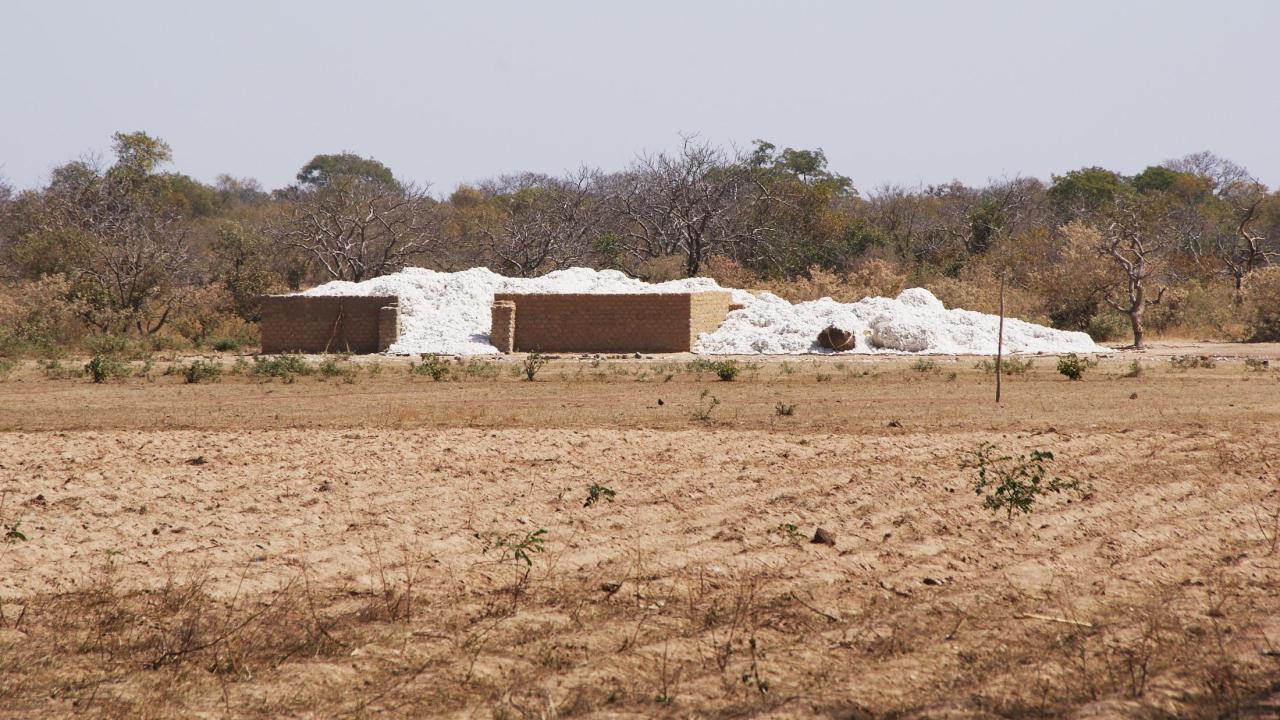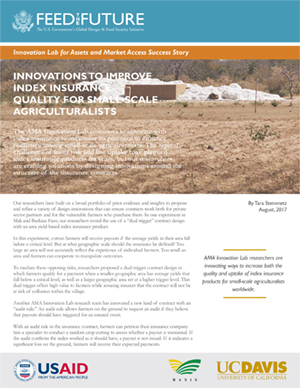
The AMA Innovation Lab continues to innovate with index insurance to maximize its potential to enhance resilience among small-scale agriculturalists. The typical challenges of basis risk and low uptake have plagued index insurance products for years, but our researchers are crafting solutions by designing innovations around the structure of the insurance contracts.
 Our researchers have built on a broad portfolio of prior evidence and insights to propose and refine a variety of design innovations that can ensure contracts work both for private sector partners and for the vulnerable farmers who purchase them. In one experiment in Mali and Burkina Faso, our researchers tested the use of a “dual trigger” contract design with an area yield-based index insurance product.
Our researchers have built on a broad portfolio of prior evidence and insights to propose and refine a variety of design innovations that can ensure contracts work both for private sector partners and for the vulnerable farmers who purchase them. In one experiment in Mali and Burkina Faso, our researchers tested the use of a “dual trigger” contract design with an area yield-based index insurance product.
In this experiment, cotton farmers will receive payouts if the average yields in their area fall below a critical level. But at what geographic scale should the insurance be defined? Too large an area will not accurately reflect the experience of individual farmers. Too small an area and farmers can cooperate to manipulate outcomes.
To mediate these opposing risks, researchers proposed a dual-trigger contract design in which farmers qualify for a payment when a smaller geographic area has average yields that fall below a critical level, as well as a larger geographic area set at a higher trigger level. This dual trigger offers high value to farmers while assuring insurers that the contract will not be at risk of collusion within the village.
Another AMA Innovation Lab research team has innovated a new kind of contract with an “audit rule.” An audit rule allows farmers on the ground to request an audit if they believe that payouts should have triggered for an insured event.
With an audit rule in the insurance contract, farmers can petition their insurance company hire a specialist to conduct a random crop cutting to assess whether a payout is warranted. If the audit confirms the index worked as it should have, a payout is not issued. If it indicates a significant loss on the ground, farmers will receive their expected payments.
This year, a research team is piloting a project to examine the impact of an audit rule in Tanzania and Mozambique. The results could provide insight in how to overcome the potential for index insurance contracts to fail the farmers who need them.
Another research team has proposed a new model for scaling index insurance uptake in an area by pairing it with existing micro-finance (MFI) operations. This Village Insurance-Savings Accounts (VISA) model could create a market for index insurance and increase its uptake among small-scale farmers. Creating a dedicated savings account for interested savings group members to purchase index insurance could make it easier for farmers to accumulate the funds needed to pay premiums.
With this VISA model, MFI staff would explain to existing savings groups the benefits and limitations of available index insurance while facilitating saving for premiums. In addition, they would manage insurance sales and the distribution of payouts. While this design has not yet been field-tested, AMA Innovation Lab researchers are optimistic about the potential impacts of this design, and hope to test this model soon.
Projects Featured
Using Index Insurance to Promote Investment in West Africa’s Cotton Industry
As part of the AMA Innovation Lab’s Index Insurance Innovation Initiative (I4), a project in Mali and Burkina Faso is using an innovative multi-scale index insurance product that pays farmers when they most need help. The multi-scale design minimizes contract failure while still ensuring that it limits opportunities for moral hazard.
Results
- A two-scale contract can, at the same premium rate, radically reduce the probability that a village is not paid when their yields are low (from 45% under the single-scale contract to only 7% under the multi-scale contract).
- In the first year of the program, 16 of the 58 treatment cooperatives (30%) agreed to purchase the index insurance contract.
Agricultural Insurance in Nepal
This I4 project is a feasibility study exploring the possibility of agricultural insurance in Nepal’s rice-growing Terai region. This study will assess both the technical options available and the development impacts to determine where – and for what commodity – an index-based insurance product might be of high value to farmers.
Results
- An area yield-based index insurance contract has the greatest potential to predict farmer losses and to protect them against risk.
- A pilot study could assess the implementation costs and the development impacts of an area yield contract in this area. Scaling up would only be worthwhile if its social and economic impacts are large enough to justify the costs.
This report is made possible by the generous support of the American people through the United States Agency for International Development (USAID). The contents are the responsibility of the Feed the Future Innovation Lab for Assets and Market Access and do not necessarily reflect the views of USAID or the United States Government.
